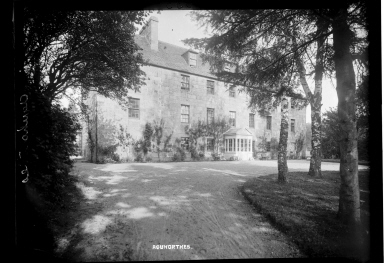
The lands of Aquhorthies were acquired by the
Setons sometime in the early 17th century, and the old house
at Aquhorthies was acquired by John Seton, son of William of Mounie.
William Seton was a noted as one of the most
learned men of his time. In his "History of Scottish
Writers", Dempster refers to William Seton Regius Professor of
Jurisprudence at Angiers, as one of the greatest lawyers of his
age. He was residing at Rome when Dempster wrote his History
(c. 1627), and was the same "le docteur William Seton" mentioned
by Francisque Michel (Les Ecassais en France, ii. 295) as one of
the most learned men of his time - a distinguished "jurisconsulte,"
and, in the opinion of his contemporaries, "le flambeau de
l'epoque". It is of no surprise then, that his son John
Seton of Aquhorthies became Chamberlain to the Earl of Dunfermline
at Fyvie Castle.
John Seton of Aquhorthies was
descended from
William Seton, 5th of Meldrum,
through the line of Lumphard, Broomhill and Mounie, and
acquired
the lands and farm of Aquhorthies through his father's assistance.
He built the house of Aquhorthies which was his private residence
when he was not stationed at Fyvie Castle. He married Helen
Leith, daughter of John Leith 2nd of Harthill (d. 1625) and Helen
Auchinleck, and had several children. He is remembered in
the family papers of the Skene's of Rubislaw:
"Letter from John Seton to Laird of
Tibertis (Tipperty) sending wood to aid cure for the gravel for
his cousin John Skene's wife, dated at Auchquhorty, 17 June 1638".
From John Seton descend many of the Seaton's of Ulster, Ireland,
and the Seeton's of Nova Scotia.
Later, Aquhorthies became
associated with:
Thomas Forbes, 1661 - 1673;
William Fordyce,
Baillie of Aberdeen;
and Bishop Hay, RC. The bishop was buried on the Leslie estate of
Fetternear, having died nearby at the Aquhorthies seminary (which
replaced Scalan). During his funeral procession, "his body
was taken from Aquhorthies with the students ‘all dressed in
mourning accompanied the hearse and made a very decent
appearance.’ The House eventually became a Roman Catholic College.
It is interesting to note that
the three JK paintings of the region: of Scalan, Aquhorthies and
Blairs, are all attributed to James Keenan 1844-1932. The ‘Scots
Colleges in Catholic Europe’ exhibition [Edinburgh City Art
Centre].